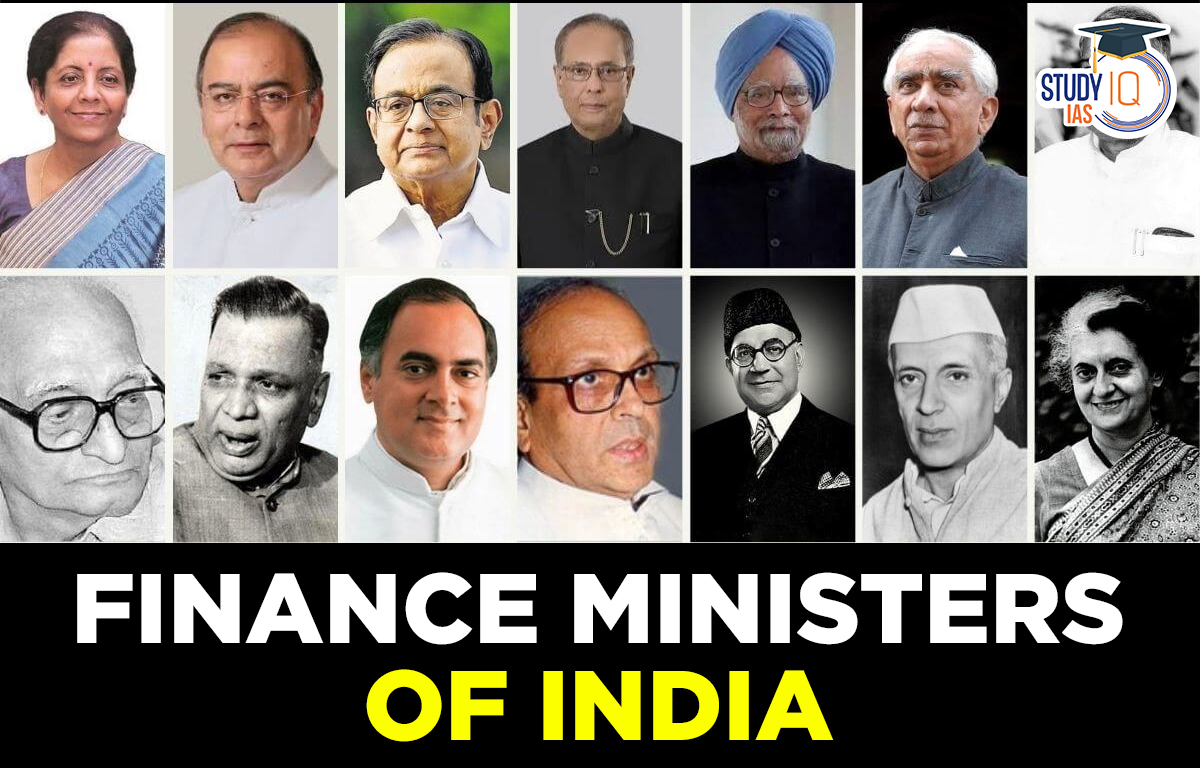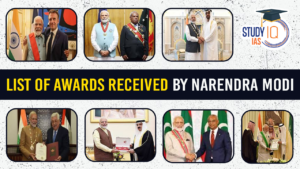Table of Contents
The Finance Minister of India plays a central role in steering the nation’s economy through policy reforms, budget allocations, and fiscal management. Since Independence in 1947, India has seen several visionary finance ministers who helped lay the foundation for the nation’s economic growth. Whether it was liberalization under Manmohan Singh, nationalization efforts during Indira Gandhi’s era, or recent privatization policies under Nirmala Sitharaman, each Finance Minister contributed significantly to India’s economic journey.
This article offers an exhaustive list of India’s Finance Ministers, including details about the first, the first woman, and the current Finance Minister, along with their roles, email contact, and FAQs.
Current Finance Minister of India
| Title | Details |
|---|---|
| Party | Bharatiya Janata Party |
| Father’s Name | Shri Narayanan Sitharaman |
| Mother’s Name | Shrimati Savitri |
| Date of Birth | 18 August 1959 |
| Place of Birth | Madurai (Tamil Nadu) |
| Educational Qualifications | M.A. (Economics), M.Phil, Educated at Seethalakshmi Ramaswamy College, Tiruchirapalli, Tamil Nadu and Jawaharlal Nehru University, New Delhi |
| Position Held | |
| 2003-2005 | Member, National Commission for Women |
| Since 2008 | Member, BJP National Executive |
| 2010-2014 | National Spokesperson, B.J.P. |
| 26 May 2014 – 9 Nov. 2014 | Minister of State in the Ministry of Finance; and Minister of State in the Ministry of Corporate Affairs |
| 26 May 2014 – 3 Sept. 2017 | Minister of State (Independent Charge) of the Ministry of Commerce and Industry |
| June 2014 | Elected to Rajya Sabha (resigned w.e.f. 17 June 2016) |
| July 2016 | Elected to Rajya Sabha (second term) |
| 3 Sept. 2017 – 30 May 2019 | Minister of Defence |
| 31 May 2019 – 9 June 2024 | Minister of Finance and Minister of Corporate Affairs |
| July 2022 | Re-elected to Rajya Sabha (third term) |
| 10 June 2024 onwards | Minister of Finance and Minister of Corporate Affairs |
First Finance Minister: R.K. Shanmukham Chetty
R.K. Shanmukham Chetty (1892-1953) was India’s first Union Finance Minister. Although he was not known for public speaking, he made a notable statement during his first Budget reply, saying that with self-confidence and determination, one can overcome challenges. Chetty came from a wealthy background and had a successful career. He introduced the term “mixed economy” in the government’s Budget document, emphasizing the importance of both private and state enterprises in India’s economic development. In his 1947-48 Interim Budget, he highlighted the need to learn from private sector experience while building the country’s industrial economy.
- Tenure: 15 August 1947 – 17 August 1948
- Key Contributions: Presented the first budget of independent India on 26 November 1947, focusing on fiscal discipline, economic stabilization, and addressing post-partition challenges such as food shortages and refugee rehabilitation.
List of Finance Ministers of India
Here is complete Finance Ministers of India List:
| Name | Term of office from start till service end | Prime Minister | |
| Liaquat Ali Khan | 29 October 1946 | 14 August 1947 | Jawaharlal Nehru |
| R. K. Shanmukham Chetty | 15 August 1947 | 17 August 1948 | Jawaharlal Nehru |
| John Mathai | 22 September 1948 | 26 January 1950 | |
| 26 January 1950 | 6 May 1950 | ||
| 6 May 1950 | 1 June 1950 | ||
| C. D. Deshmukh | 1 June 1950 | 13 May 1952 | |
| 13 May 1952 | 1 August 1956 | ||
| Jawaharlal Nehru | 1 August 1956 | 30 August 1956 | |
| T. T. Krishnamachari | 30 August 1956 | 17 April 1957 | |
| 17 April 1957 | 14 February 1958 | ||
| Jawaharlal Nehru | 14 February 1958 | 22 March 1958 | |
| Morarji Desai | 22 March 1958 | 10 April 1962 | |
| 10 April 1962 | 31 August 1963 | ||
| T. T. Krishnamachari | 31 August 1963 | 31 December 1965 | Jawaharlal Nehru Lal Bahadur Shastri |
| Sachindra Chaudhuri | 1 January 1966 | 11 January 1966 | Lal Bahadur Shastri Indira Gandhi |
| 11 January 1966 | 24 January 1966 | ||
| 24 January 1966 | 13 March 1967 | ||
| Morarji Desai | 13 March 1967 | 16 July 1969 | Indira Gandhi |
| Indira Gandhi | 16 July 1969 | 27 June 1970 | |
| Yashwantrao B. Chavan | 27 June 1970 | 18 March 1971 | |
| 18 March 1971 | 10 October 1974 | ||
| Chidambaram Subramaniam | 10 October 1974 | 24 March 1977 | |
| Haribhai M. Patel | 26 March 1977 | 24 January 1979 | Morarji Desai |
| Charan Singh | 24 January 1979 | 16 July 1979 | |
| Hemvati Nandan Bahuguna | 28 July 1979 | 19 October 1979 | Charan Singh |
| R. Venkataraman | 14 January 1980 | 15 January 1982 | Indira Gandhi |
| Pranab Mukherjee | 15 January 1982 | 31 October 1984 | |
| 31 October 1984 | 31 December 1984 | ||
| V. P. Singh | 31 December 1984 | 14 January 1985 | Rajiv Gandhi |
| 14 January 1985 | 30 March 1985 | ||
| 30 March 1985 | 25 September 1985 | ||
| 25 September 1985 | 24 January 1987 | ||
| Rajiv Gandhi | 24 January 1987 | 25 July 1987 | |
| N. D. Tiwari | 25 July 1987 | 25 June 1988 | |
| Shankarrao B. Chavan | 25 June 1988 | 2 December 1989 | |
| Madhu Dandavate | 5 December 1989 | 10 November 1990 | V. P. Singh |
| Yashwant Sinha | 21 November 1990 | 21 June 1991 | Chandra Shekhar |
| Manmohan Singh | 21 June 1991 | 16 May 1996 | P. V. Narasimha Rao |
| Jaswant Singh | 16 May 1996 | 1 June 1996 | Atal Bihari Vajpayee |
| P. Chidambaram | 1 June 1996 | 21 April 1997 | H. D. Deve Gowda |
| I.K. Gujral | 21 April 1997 | 1 May 1997 | I. K. Gujral |
| P. Chidambaram | 1 May 1997 | 19 March 1998 | |
| Yashwant Sinha | 19 March 1998 | 13 October 1999 | Atal Bihari Vajpayee |
| 13 October 1999 | 1 July 2002 | ||
| Jaswant Singh | 1 July 2002 | 22 May 2004 | |
| P. Chidambaram | 23 May 2004 | 30 November 2008 | Manmohan Singh |
| Manmohan Singh | 30 November 2008 | 24 January 2009 | |
| Pranab Mukherjee | 24 January 2009 | 22 May 2009 | |
| 23 May 2009 | 26 June 2012 | ||
| Manmohan Singh | 26 June 2012 | 31 July 2012 | |
| P. Chidambaram | 31 July 2012 | 26 May 2014 | |
| Arun Jaitley | 26 May 2014 | 30 May 2019 | Narendra Modi |
| Nirmala Sitharaman | 31 May 2019 | Present | Narendra Modi |
Roles and Responsibilities of the Finance Minister
The Finance Minister handles key tasks that impact every citizen of India. The main responsibilities include:
-
Formulation and presentation of Union Budget
-
Setting up fiscal policy and taxation framework
-
Managing government borrowings and national debt
-
Supervising departments under the Finance Ministry:
-
Revenue
-
Expenditure
-
Economic Affairs
-
Investment & Public Asset Management
-
Financial Services
-
-
Planning economic strategies to tackle inflation, recession, or global crises
-
Overseeing financial institutions like RBI, SEBI, LIC, and PSU banks


 Cat Bonds (Catastrophe Bonds), Meaning, ...
Cat Bonds (Catastrophe Bonds), Meaning, ...
 List of Awards and Honours Received by N...
List of Awards and Honours Received by N...
 What is Visible and Invisible Trade with...
What is Visible and Invisible Trade with...





















